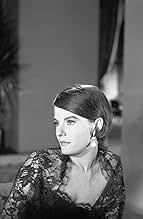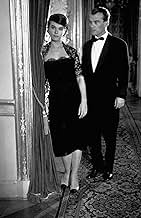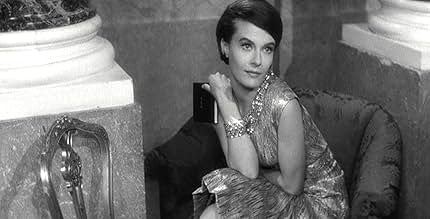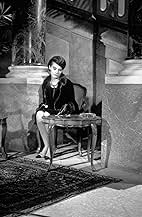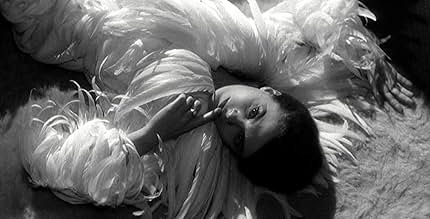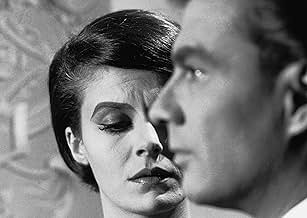L'année dernière à Marienbad
- 1961
- Tous publics
- 1h 34m
IMDb RATING
7.6/10
26K
YOUR RATING
In a strange and isolated chateau, a man becomes acquainted with a woman and insists that they have met before.In a strange and isolated chateau, a man becomes acquainted with a woman and insists that they have met before.In a strange and isolated chateau, a man becomes acquainted with a woman and insists that they have met before.
- Nominated for 1 Oscar
- 2 wins & 5 nominations total
Karin Toeche-Mittler
- Un personnage de l'hôtel
- (as Karin Toche-Mittler)
Davide Montemurri
- Un personnage de l'hôtel
- (as Davide Montemuri)
Alan Edwards
- English Introduction
- (uncredited)
- Director
- Writer
- All cast & crew
- Production, box office & more at IMDbPro
Featured reviews
Human-like aliens on a earth-like planet in a parallel universe. Life forms consist of about 50 or so replicants living in a luxurious hotel. They speak French, wear tuxedos and evening gowns, but their emotions are all but drained. They're very stiff and robotic. No one is seen eating food although they're always making plans for dinner. They enjoy posing, especially in gardens.
The actual story involves a "rebel" known as X. He is the only one that exudes anything resembling human romantic desire. He takes a shine to a femalien known as A who is in residence with her lover/husband M. X realizes that M doesn't love A, so he feels it's alright to steal her away. All he had to do is convince A that she promised to go away with him a year ago and that she wanted one year to prepare. A doesn't remember the promise and X's efforts to convince her are like trying to unlock a door with a wet noodle. Love finally triumphs in the end as A eventually runs away with X in the night leaving M standing alone on the staircase with a blank expression.
The director, Alain Resnais, is firmly quoted as saying that the film has no meaning. However, with so many people arguing that the film is loading with symbolism and is indeed much like a game or puzzle to be solved, I interpreted the film in a way that entertains me the most. That's my story and I'm sticking to it.
Hope you like it.
The actual story involves a "rebel" known as X. He is the only one that exudes anything resembling human romantic desire. He takes a shine to a femalien known as A who is in residence with her lover/husband M. X realizes that M doesn't love A, so he feels it's alright to steal her away. All he had to do is convince A that she promised to go away with him a year ago and that she wanted one year to prepare. A doesn't remember the promise and X's efforts to convince her are like trying to unlock a door with a wet noodle. Love finally triumphs in the end as A eventually runs away with X in the night leaving M standing alone on the staircase with a blank expression.
The director, Alain Resnais, is firmly quoted as saying that the film has no meaning. However, with so many people arguing that the film is loading with symbolism and is indeed much like a game or puzzle to be solved, I interpreted the film in a way that entertains me the most. That's my story and I'm sticking to it.
Hope you like it.
It would take a braver person than me to delineate what LAST YEAR AT MARIENBAD is `about', but as it is such an entirely thought provoking film, perhaps some sort of `meaning' can come from sharing these thoughts about it. Many people define it as cerebral and classical, but to me it is romantic and gothic. What is remarkable about the setting and the characters is that they are all so wealthy that they can rise above the concerns of ordinary mortals, only to find that this advantaged life brings other problems - of identity, purpose and values. They are strangely existentialist - the existentialism of great wealth - their small talk is intelligent, informed and stilted; they are all beautiful in the sense that money can partly buy beauty, and yet, in the process, they have lost human warmth, real sexual desire, and any purpose in life other than to drift on in their station in life. But desire is a respecter of nobody, and it is this element of human nature that haunts the corridors of the hotel like an invisible mist, and subconsciously their acutely civilised life-style which has bereaved them of something they no longer acknowledge or recognise and have deeply repressed - only to find it lingers on the fringes, confusing and disturbing them - spoiling everything; a depressive dissatisfaction. There is no joy, no enjoyment. The gardens become symbols of this desire to enslave, conquer and exile nature - formal, rigid and planned, and yet within the hotel, all around are decorative symbols of the chaotic and random aspects of nature. Everything appears to carry a symbol that needs to be interpreted - if it is there, it must have meaning, and if the Man says that they had arranged to elope together when they were at Marienbad, (or was it Marienbad, or elsewhere, and what does it matter?), how can the Woman be sure that this is not a ruse, made up to give immediate warning that we exile our emotions at our peril? That to acknowledge this for one second risks opening floodgates which will overwhelm and destroy? Or, that the ultimate expression of desire is death itself, as the film's closing line hints when the Man's voice speaks, over the night time silhouette of the hotel, of, `You.. and me.. together.. always.. in the night'. And it is an eternal night that we all subconsciously know lays in wait for us. The Great Leveller indeed! A remarkable film by any standards, and one which for me at least, is much darker and more sinister than has generally been recognised. But maybe it is just a springboard from which we can all set off on a journey guided by our own subconscious longings and dreads?
This mysterious film shows us a man and a woman in an extravagant and capacious hotel. The man insists that he had an affair with the lady last year in Marienbad (or was it somewhere else?) The woman denies it, and just wants the man to leave her alone. Perhaps the man did meet her, perhaps he didn't. Resnais puts the pieces there and lets us take what we can from it.
The beautiful looking establishment, complete with gardens of splendour, is an eerie setting for the film. The guests seem like they are in a trance most of the time. A card game is shown where a man cannot be beaten, he claims. The cinematography is brilliant. Dark, then white, giving a blinking effect at times; and constantly switching between different locations. The music throughout the film sounds like it's from an old church organ. I can understand why this film will put off some people, because it doesn't explain much, and does meander at a pedestrian pace. But approached in the right mood, and watched in a dark room, this is a film to appreciate. Peter Greenaway thinks so; the film was influential in the making of The Draughtsman's Contract, and is (supposedly) the film Greenaway most admires.
The beautiful looking establishment, complete with gardens of splendour, is an eerie setting for the film. The guests seem like they are in a trance most of the time. A card game is shown where a man cannot be beaten, he claims. The cinematography is brilliant. Dark, then white, giving a blinking effect at times; and constantly switching between different locations. The music throughout the film sounds like it's from an old church organ. I can understand why this film will put off some people, because it doesn't explain much, and does meander at a pedestrian pace. But approached in the right mood, and watched in a dark room, this is a film to appreciate. Peter Greenaway thinks so; the film was influential in the making of The Draughtsman's Contract, and is (supposedly) the film Greenaway most admires.
My top 5: Alain Robbe-Grillet's "L'Imortelle" takes number 1 (by a landslide), and its a tie between David Lynch's Eraserhead & Blue Velvet for position 3, closely followed by Louis Buñuel's "Andalusian Dog" and Stan Brackage's "Dog Star Man" (which I would have rated number 1, except that I hated that so much I will not give it the satisfaction of being highly rated in any category!) and finally "Koyanisquatsi" which I defy any to explain or justify!
So - Last Year At Marienbad, in a nutshell, assume French Accent:
Verse 1: Man: I know you. Woman: You do not know me. Man: We were here. Woman: I was never here. Chorus: Man: Long strange monologue about the place that they are at, Marienbad. And how he has been here before and how she has been here before. Camera: panning about the ornate Marienbad mansion. Verse 2: (repeat verse 1 - add very interesting game of pick-up sticks) Chorus repeat verses 1 & 2
I think everyone should see this film. I don't know why. I have seen it numerous times. No, I have never seen it. Yes, I saw it last year! No, last year I did not see it. Yes, I saw it here, with me. Wait, I'm alone. Who am I talking to?
So - Last Year At Marienbad, in a nutshell, assume French Accent:
Verse 1: Man: I know you. Woman: You do not know me. Man: We were here. Woman: I was never here. Chorus: Man: Long strange monologue about the place that they are at, Marienbad. And how he has been here before and how she has been here before. Camera: panning about the ornate Marienbad mansion. Verse 2: (repeat verse 1 - add very interesting game of pick-up sticks) Chorus repeat verses 1 & 2
I think everyone should see this film. I don't know why. I have seen it numerous times. No, I have never seen it. Yes, I saw it last year! No, last year I did not see it. Yes, I saw it here, with me. Wait, I'm alone. Who am I talking to?
The title of Dali's best known work is an apt description of this film. A man meets a woman at a European spa and tries to convince her (and himself) that they met one year ago. While the plot is simple, its presentation is not. I first saw L'annee derniere a Marienbad while taking a French Film class in college. Of the dozen or so films we watched, Marienbad has stayed with me the longest. The nameless protagonist's memories repeat, sometimes minutely changed, sometimes not. The same organ motifs echo again and again, all against the backdrop of elegant hallways and sitting rooms. Through all this, the man attempts to spirit the woman away from her husband/companion, while at the same time establish once and for all what happened last year and what did not. More than any other film, Marienbad has shown me the difference between American film conventions and what else is possible. While so many American releases are rigidly plot driven, Marienbad uses film as a tool for exploration and introspection. Instead of linear story telling, director Resnais allows his characters to explore the details of what may be memory or just imagination. Against a detached, almost stoical background of extras and cool interiors, Delphin Seyrig and Giorgio Albertazzi display a sharp contrast of passion, pleading, and denial. I agree with a previous reviewer that much of the look of Marienbad has been appropriated by commercials for perfume; however, if you haven't seen this film before, you most likely have never seen anything quite so surreal.
Did you know
- TriviaThe match game in the movie is named as "Nim". In order to win the game there is only one tactic including a system called "Nim Sum". If both players use this tactic perfectly, then the owner of the first move will eventually lose. Due to the same reason, it is always disadvantageous to start the game first.
- GoofsExterior night scenes were shot day-for-night, but the sky and reflections of it were allowed in the frame, and they appear as bright white instead of black. This may have been intentional to emphasize the surreality of the film.
- Quotes
[X wanders through the hotel's corridors cataloging items he sees]
X: Empty salons. Corridors. Salons. Doors. Doors. Salons. Empty chairs, deep armchairs, thick carpets. Heavy hangings. Stairs, steps. Steps, one after the other. Glass objects, objects still intact, empty glasses. A glass that falls, three, two, one, zero. Glass partition, letters.
- ConnectionsFeatured in Fejezetek a film történetéböl: A francia új hullám (1990)
- How long is Last Year at Marienbad?Powered by Alexa
Details
- Release date
- Countries of origin
- Official site
- Language
- Also known as
- Last Year at Marienbad
- Filming locations
- Production companies
- See more company credits at IMDbPro
Box office
- Gross US & Canada
- $207,917
- Opening weekend US & Canada
- $15,485
- Jan 20, 2008
- Gross worldwide
- $223,111
- Runtime1 hour 34 minutes
- Color
- Sound mix
- Aspect ratio
- 2.35 : 1
Contribute to this page
Suggest an edit or add missing content



